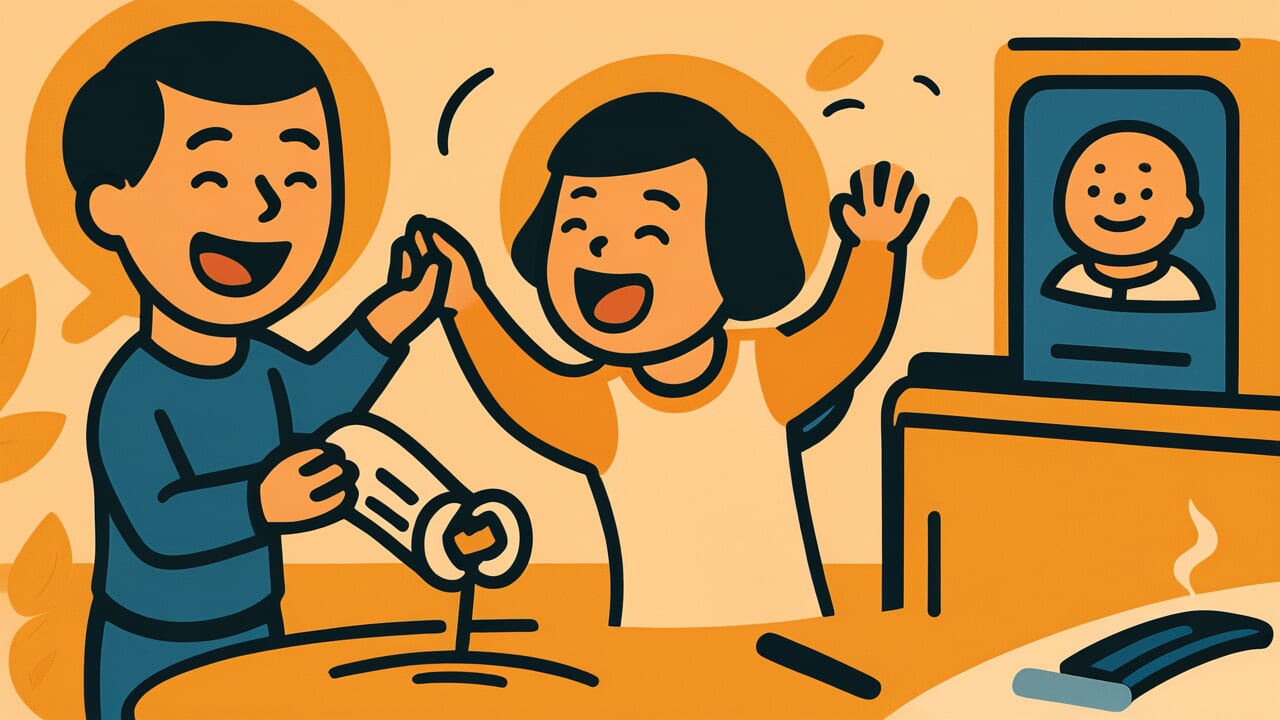How to Read “Raise with tears and let go with laughter”
Naite sodatete waraute kakare
Meaning of “Raise with tears and let go with laughter”
This proverb teaches that raising children involves great hardship, but those who persevere will be rewarded in their later years.
When children are young, parents lose sleep and face endless worries. These are truly days filled with tears.
However, if you pour love into raising them without sparing effort, your children will grow into fine adults. Eventually, they become people who support their parents in old age.
When that happens, parents can welcome their later years with smiles. This proverb encourages parents who feel overwhelmed by immediate struggles.
It shows them the happy future that lies beyond child-rearing. Even today, when exhausted by parenting challenges, these words offer hope.
They remind us that “today’s hardships are never wasted.”
Origin and Etymology
The exact literary origin of this proverb is unclear. However, its structure offers interesting insights.
The expression “Raise with tears and let go with laughter” is built around two contrasting verbs: “cry” and “laugh.”
The phrase “raise with tears” expresses the hardships of child-rearing. From the Edo period through the Meiji era, child mortality rates were high.
Parents raised children while constantly facing anxiety and sorrow. They dealt with night crying and feared illness. They literally shed tears while raising their children day after day.
Meanwhile, “let go with laughter” uses the word “kakare,” which means to enter one’s later years or old age. In other words, children you raised with hardship grow up and show filial devotion.
This allows parents to spend their old age with smiles. That meaning is embedded in the phrase.
This expression emerged from the mutual support system within agricultural village society. Children were future labor and the ones who would support parents in old age.
That’s why this proverb teaches that you should devote yourself to child-rearing no matter how difficult it becomes. The connecting particle “te” and the expression “waraute” are characteristic of Kansai dialect.
This suggests the proverb likely originated in western Japan.
Usage Examples
- I’m losing sleep every night because of my baby’s crying, but “Raise with tears and let go with laughter” reminds me that now is the time to persevere
- Watching my grandchildren grow, I realize those difficult child-rearing days truly were “Raise with tears and let go with laughter”
Universal Wisdom
The universal truth this proverb speaks about is the time gap between “investment and return” in life.
Humans are sensitive to immediate suffering. But feeling distant future happiness is difficult. This is especially true for long-term endeavors like child-rearing.
Today’s efforts won’t bear fruit until many years later.
Why did our ancestors need this proverb? Because humans are essentially beings who live “in the now.”
The baby’s crying right in front of you, the pain of sleep deprivation, the suffering of having no personal time—these weigh heavily as reality. Meanwhile, the image of your child grown and grateful twenty years later is just a phantom of an unseen future.
This proverb is wisdom born from understanding that human weakness. By putting into words the promise that “you’re crying now, but a day will surely come when you can laugh,” people gained strength to overcome difficulties.
This truth applies not just to child-rearing but to all long-term efforts.
A deeper insight lies in how the proverb uses the passive expression “let go with laughter.” You don’t go seeking laughter yourself. Rather, a state arrives where you naturally smile.
In other words, if you make the right efforts, happiness comes to you. This life philosophy is embedded in these words.
When AI Hears This
This proverb expresses with surprising accuracy the mechanism by which the human brain grows through alternating experiences of security and challenge.
Developmental psychologist Mary Ainsworth’s research observed 12-month-old infants. She found that children who cried and were comforted by their mothers showed more active exploratory behavior in unfamiliar environments later.
In other words, the secure base formed during the “raise with tears” stage creates a kind of psychological buffer in the brain.
This isn’t merely a matter of emotions. Neuroscience research confirms that children who receive responsive care from caregivers develop properly regulated cortisol secretion and thicker neural circuits in the prefrontal cortex.
What’s interesting is that this prefrontal cortex governs risk assessment and decision-making. The experience of crying and being accepted carves neural pathways in the brain that say “it’s okay to fail.”
Then at the “let go with laughter” stage, children can try new things without excessive anxiety. This proverb doesn’t view dependence and independence as opposing concepts.
Instead, it recognizes that dependence itself is the neural foundation that produces true independence.
Lessons for Today
What this proverb teaches modern you is “the importance of accepting present hardships for worthwhile goals.”
Modern society strongly tends toward instant gratification. We struggle to see value in things that don’t show immediate results. But truly important things can’t be obtained without time.
Not just child-rearing, but academics, career building, relationship development, health management—all important life areas require long-term perspective.
Today’s efforts may not be rewarded immediately tomorrow. But that’s okay. In fact, what you nurture over time brings the deepest joy to your life.
What matters is accepting hardship as hardship while believing in the smile that lies ahead. You don’t need to be perfect.
Even while crying, if you keep moving forward one step at a time, the season will surely change. If you’re seriously working on something now, that effort will never be wasted.
A day will surely come when your future self thanks your present self.



Comments